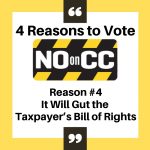Four reasons to vote no on Proposition CC
There are many reasons to vote no on Proposition CC, but for the sake of brevity, I will stick with the basics.
 Reason No. 1: It does raise taxes.
Reason No. 1: It does raise taxes.
While the first three words of the ballot language for Proposition CC are “Without raising taxes,” this simply isn’t true. And it’s hard to understand how proponents can keep a straight face with this one. If the state owes us money in the form of a refund because we’ve overpaid our taxes, and if they don’t give us the refund, we will in fact pay more taxes than we would have without Proposition CC. Period.
 Reason No. 2: The state does not need more money.
Reason No. 2: The state does not need more money.
In the last decade the population of Colorado has grown 15%. During that same time period, the Colorado state budget has grown by 71%. Colorado doesn’t have a revenue problem, our politicians have a spending problem. Spending has exploded. And yet we see no results. Has the education system improved by 71%? Have our roads improved by 71%? Clearly, they have not.
 Reason No. 3: It’s a blank check. Speaker of the House, KC Becker, admits it is a blank check. In a House Finance Committee hearing in April she said, “As you know, Representative Beckman, one legislature can’t bind future legislators, so I don’t know what’s going to happen forevermore. And any change that is statutory, whether voters approve it or not, can always be changed by the legislature because the legislature always has the authority to change statutes.”
Reason No. 3: It’s a blank check. Speaker of the House, KC Becker, admits it is a blank check. In a House Finance Committee hearing in April she said, “As you know, Representative Beckman, one legislature can’t bind future legislators, so I don’t know what’s going to happen forevermore. And any change that is statutory, whether voters approve it or not, can always be changed by the legislature because the legislature always has the authority to change statutes.”
We are also told that we can rest assured the money will be spent as promised because of an annual audit. But we’ve heard this before. In 2005, we were promised that the $17 billion surplus from Referendum C would also go to education, transportation, and higher education, but no one can prove how the money was spent.
As reported by the Colorado News Agency, in a House Finance Committee hearing, Legislative Council staffer Kate Watkins said, “There is some difficulty in really identifying what revenue from Referendum C went where, and a lot of it has to do with the fungibility of money. Basically, we don’t know exactly where the Referendum C dollars go.”
 Reason No. 4: It will gut the Taxpayer’s Bill of Rights (TABOR).
Reason No. 4: It will gut the Taxpayer’s Bill of Rights (TABOR).
Supporters of Proposition CC often say that if voters have already approved a particular tax, the state should be able to keep all the funds that come in for that tax. But there are two simple reasons why they shouldn’t.
First, it’s one of the core parts of TABOR. It was written in the ballot language when voters approved TABOR. It states it is intended to “limit the rate of increase in state and local government spending.”
That’s pretty clear to me. TABOR wasn’t just about requiring voter approval for new taxes, it was intended to limit the growth of government by population plus inflation.
Second, and perhaps most concerning, is the recent ruling by the Colorado Supreme Court that basically said “fees” are not taxes. Because of this ruling, the state government can now in effect add an unlimited number of new taxes by simply calling them fees. And the only thing that keeps some of them in check, is the provision in TABOR that limits increase in spending.
Prop CC removes that limit. Entirely. Forever.
The state has already implemented two taxes we didn’t get to vote on, by simply calling them fees.
The first one was FASTER, a 2009 bill that increased vehicle registration costs. It was supposed to improve roadway safety, repair deteriorating bridges, and support and expand transit. (Hmmm … I think I’m seeing a trend here). So, every year since 2009 when you’ve paid your vehicle registration, you’ve paid an extra tax that you didn’t get to vote on.
More recently it was the Hospital Provider Fee, which is basically a bed tax. It’s a new charge on patients for every night that they are in the hospital. And you didn’t get to vote on it.
If Proposition CC passes, there will be no end to the number of similar new taxes that can be added … without the spending limits which will forever be removed.
Janet Rowland is a former Mesa County commissioner. She is the former executive director at CASA and now works for Project 1.27, a faith-based nonprofit that recruits foster families.
http://grandjunctiondailysentinel.co.newsmemory.com/?publink=30b1a3361#.XacvV7qdP18.twitter
Leave a Reply